
May 23
1900 Birth: Hans Frank in Karlsrule, Germany:

Frank joined the German Army in 1917, and fought in World War I. After the war, he studied Law and economics. In 1919, Frank joined the German Workers Party (DAP) and later took part in the Beer Hall Putsch. He subsequently trained as a lawyer and became Adolf Hitler's legal adviser and also of the NSDAP. In 1930 he was elected to the Reichstag.
After the Nazis came to power in Germany in 1933, Frank was appointed to a variety of important posts, including President of the Reichstag, and Minister of Justice in the Nazi government. In this post, he complained about illegal killings in the Dachau concentration camp. During the "Night of the Long Knives," Frank raised objections to the proposed execution, without trial, of 110 members of the Sturm Abteilung (SA). As a result of his intervention, only 20 of these men were shot. After this, Frank lost his influence in the NSDAP hierarchy.
After the German invasion of Poland in 1939, Frank was appointed governor-general, becoming the supreme chief of occupied Poland's civil administration. An enthusiastic proponent of Nazi racist ideology, Frank ordered the execution of hundreds of thousands of Poles, the wholesale confiscation of Polish property; the enslavement of hundreds of thousands of Polish workers, who were shipped to Germany; and the herding of most of Poland's Jews into ghettos, as a prelude to their extermination. Frank remained as governor-general until the war's end.
1906 Death: Ivan Kalyayev:
Ivan Kalyayev (also transliterated Kaliayev, or Kaliaev) is hanged for assassinating Grand Duke Sergei Alexandrovich in Moscow. [For further details, Click here]

1915 World War I: Various:
List Regiment: Gefreiter Adolf Hitler's 16 Reserve Infantry Regiment occupy a position—at Fromelles (pictured above in a drawing by Hitler—which is on a level field with water channels, willow trees and willow stalks, in the distance towards the enemy lines lie an insignificant wood with barbed wire entanglements. Under the direction of their defense-minded commander, Lieutenant General Gustav Scanzoni von Lichtenfels, the regiment works ceaselessly day and night to further fortify their position at Fromelles while fighting off repeated assaults by the enemy. [For further details, Click here.]
Italy declares war on Austria-Hungary, having been neutral hitherto:
Click here to read Austro-Hungarian Emperor Franz Josef's reaction to the Italian declaration. Click here to read German Chancellor Theobald von Bethmann-Hollweg's reaction.
The Italian army, commanded by General Luigi Cadorna, is about 875,000 strong. Italian Prime Minister, Antonio Salandra, issues the following declaration:
I address myself to Italy and to the civilized world in order to show not by violent words, but by exact facts and documents, how the fury of our enemies has vainly attempted to diminish the high moral and political dignity of the cause which our arms will make prevail. I shall speak with the calm, of which the King of Italy has given a noble example, when he called his land- and sea-forces to arms.
1916 World War I: List Regiment: Gefreiter Adolf Hitler endures trench warfare in Flanders (Artois) with 3 Company, 16 Reserve Infantry Regiment. [For further details, Click here.]
1917 World War I: List Regiment: Gefreiter Adolf Hitler's 16th RIR redeploy east of Douai for a period of rest which will extend until June 24. [For further details, Click here.]
1918 World War I: List Regiment: Gefreiter Adolf Hitler's 16th RIR is behind the lines for a period of rest that will last until May 30. [For further details, Click here.]
1923 Birth: Walter Wolfrum: German fighter pilot credited with 137 confirmed kills in World War II.
1929 Mickey Mouse: The Karnival Kid is released: The first talking cartoon, a favorite of both Hitler and Mussolini.
1933 Various:
Holocaust: Church leaders in the Netherlands protest Nazi treatment of Jews.
Stock Market Crash: Impeachment charges against the Federal Reserve Board:
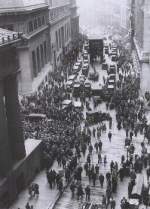
Republican Congressman Louis T. McFadden of Pennsylvania claims:
Mr. Chairman, we have in this Country one of the most corrupt institutions the world has ever known. I refer to the Federal Reserve Board and the Federal Reserve Banks, hereinafter called the Fed. The Fed has cheated the Government of these United States and the people of the United States out of enough money to pay the Nation's debt. The depredations and iniquities of the Fed has cost enough money to pay the National debt several times over. This evil institution has impoverished and ruined the people of these United States, has bankrupted itself, and has practically bankrupted our Government. It has done this through the defects of the law under which it operates, through the maladministration of that law by the Fed and through the corrupt practices of the moneyed vultures who control it.
In 1912 the National Monetary Association, under the chairmanship of the late Senator Nelson W. Aldrich, made a report and presented a vicious bill called the National Reserve Association bill. This bill is usually spoken of as the Aldrich bill. Senator Aldrich did not write the Aldrich bill. He was the tool, if not the accomplice, of the European bankers who for nearly twenty years had been scheming to set up a central bank in this Country and who in 1912 has spent and were continuing to spend vast sums of money to accomplish their purpose. We were opposed to the Aldrich plan for a central bank. The men who rule the Democratic Party then promised the people that if they were returned to power there would be no central bank established here while they held the reigns of government. Thirteen months later that promise was broken, and the Wilson administration, under the tutelage of those sinister Wall Street figures who stood behind Colonel House, established here in our free Country the worm-eaten monarchical institution of the "King's Bank" to control us from the top downward, and from the cradle to the grave.
The Federal Reserve Bank destroyed our old and characteristic way of doing business. It discriminated against our 1-name commercial paper, the finest in the world, and it set up the antiquated 2-name paper, which is the present curse of this Country and which wrecked every country which has ever given it scope; it fastened down upon the Country the very tyranny from which the framers of the Constitution sough to save us.
1936 Netherlands: Catholic bishops demand a ban on the Dutch Nazi party. (THP)
1939 Various:
Palestine: White Paper:
The British parliament approves the so-called "White Paper" by a vote of 268 to 179. This document proposes slowing the growth of the Jewish community in Palestine by limiting Jewish immigration and cutting back Jewish purchases of land. The House of Commons approves a plan for an independent Palestinian state by 1949, but the plan is denounced by both Arabs and Jews.
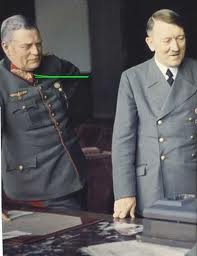
Countdown to War: Hitler orders the Military High Command to prepare for war with Poland.
[See: What Were Adolf Hitler's Major Blunders?]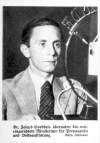
The Goebbels propaganda machine begins accusing the Poles of committing atrocities against their German-speaking minority. (THP)
1940 World War II: Various:
Evacuation from French channel ports considered by British General Staff:

Dunkirk: Hermann Goering telephones Hitler and tells him it would be a political mistake to allow the German generals to destroy the Allied army at Dunkirk. Many of the generals are suspected of being unfriendly to the Nazi Party, Goering says, while the Luftwaffe is a true National Socialist fighting force. Goering then promises Hitler that the Luftwaffe will wipe out the enemy troops at Dunkirk and have its "finest hour." (THP)
[See: Why Didn't Adolf Hitler Fire Hermann Goering?]United Kingdom: Arrests:
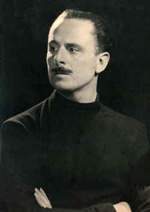
Sir Oswald Mosley: former leader of the British Union of Fascists.
Captain Ramsay: Member of Parliament, who has connections with the Right Club. (See May 18)
Composed by the Hon. Member (to be sung to the tune of Land of Hope and Glory):
Land of dope and Jewry
Land that once was free
All the Jew boys praise thee
Whilst they plunder thee.
Poorer still and poorer
Grow thy true-born sons
Faster still and faster
They're sent to feed the guns.
Land of Jewish finance
Fooled by Jewish lies
In press and books and movies
While our birthright dies.
Longer still and longer
Is the rope they get
But by the God of battles
'Twill serve to hang them yet.
1941 World War II: Various:
Economic Policy Directives for Economic Organization East:
From a study prepared by the Agricultural Group, under the direction of Goering:
The surplus territories are situated in the black soil district (that is in the south and southeast) and in the Caucasus. The deficit areas are principally located in the forest zone of the North (podsol-soil district). Therefore, an isolation of the black soil areas will in any case place greater or lesser surpluses in these regions at our disposal. The consequences will be cessation of supplies to the entire forest zone, including the essential industrial centers of Moscow and Leningrad . . . .
1. All industry in the deficit area, particularly the manufacturing industries in the Moscow and Leningrad regions as well as the Ural industrial regions will be abandoned. It may be assumed that these regions today absorb an annual 5 to 10 million tons from the food production zone.
2. The Trans-Caucasian oil district will have to be excepted, although it is a deficit area. This source of oil, cotton, manganese, copper, silk, and tea must continue to be supplied with food in any case, for special political and economic reasons.
3. No further exception, with a view to preserving one or the other industrial region or industrial enterprise, must be permitted.
4. Industry can only be preserved insofar as it is located in the surplus region. This applies, apart from the above mentioned oil field regions in the Caucasus, particularly to the heavy industries in the Donets district (Ukraine). Only the future will show to what extent it will prove possible to maintain in full these industries, and in particular the Ukrainian manufacturing industries, after the withdrawal of the food surplus required by Germany. The following consequences result from this situation, which has received the approval of the highest authorities, since it is in accord with the political tendencies (preservation of the Little Russians, preservation of the Caucasus, of the Baltic provinces, of White Russia, to the prejudice of the Great Russians).
I. For the forest zone:
a) Production in the forest zone (the food-deficit area) will become 'naturalized,' similar to the events during the World War and the Communist tendencies of the war, and so forth -namely, agriculture in that territory will begin to become a mere 'home production.' The result will be that the planting of products destined for the market, such as flax and hemp in particular, will be discontinued; and the area used therefor will be taken over for products for the producer (grain, potatoes). Moreover, discontinuance of fodder deliveries to that area will lead to the collapse of the dairy production and of pig-producing in that territory.
b) Germany is not interested in the maintenance of the productive power of these territories, except for supplying the troops stationed there. The population, as in the old days, will utilize their land for growing their own food. It is useless to expect grain or other surpluses to be produced. Only after many years can these extensive regions be intensified to an extent that they might produce genuine surpluses. The population of these areas, in particular the urban population, will have to face most serious distress from famine. It will be necessary to divert the population into the Siberian spaces. Since rail transport is out of the question, this too, will be an extremely difficult problem.
c) In this situation, Germany will only draw substantial advantages by quick, non-recurrent seizure-that is, it will be vitally necessary to make the entire flax harvest available for German needs, not only the fibers but also the oleaginous seeds. It will also be necessary to utilize for German purposes the livestock which has no fodder base of its own-that is, it will be necessary to seize livestock holdings immediately and to make them available to the troops, not only for the moment but in the long run, and also for exportation to Germany. Since fodder supplies will be cut off, pig and cattle holdings in these areas will of necessity drastically decline in the near future. If they are not seized by the Germans at an early date, they will be slaughtered by the population for their own use, without Germany getting anything out of it . . . .
It has been demanded by the Fuehrer that the reduction of the meat ration should be ended by fall. This can only be achieved by the most drastic seizure of Russian livestock holdings, particularly in areas which are in a favorable transport situation in relation to Germany . . . .
In the future, southern Russia must turn its face towards Europe. Its food surpluses, however, can only be paid for if it purchases its industrial consumer goods from Germany or Europe. Russian competition from the forest zone must, therefore, be abolished. It follows from all that has been said that the German administration in these territories may well attempt to mitigate the consequences of the famine which undoubtedly will take place and to accelerate the return to primitive agricultural conditions. An attempt might be made to intensify cultivation in these areas by expanding the acreage under potatoes or other important food crops giving a high yield. However, these measures will not avert famine. Many tens of millions of people in this area will become redundant and will either die or have to emigrate to Siberia. Any attempt to save the population there from death by starvation, by importing surpluses from the black-soil zone, would be at the expense of supplies to Europe. It would reduce Germany's staying power in the war and would undermine Germany's and Europe's power to resist the blockade. This must be clearly and absolutely understood . . . .
I. Supplies for the Army: Germany's food situation in the third year of war demands, imperatively, that the Wehrmacht, in all its provisioning, must not live off Greater German territory or that of incorporated or friendly areas from which this territory receives imports. This minimum aim, the provisioning of the Wehrmacht from enemy territory in the third year and if necessary in later years, must be attained at any price. This means that one-third of the Wehrmacht must be fully provisioned by French deliveries to the army of occupation. The remaining two-thirds (and even slightly more in view of the present size of the Wehrmacht) must without exception be provisioned from the Eastern areas . . . .
Thus it is not important, under any circumstances, to preserve what has existed; but what matters is a deliberate turning away from the existing situation and introducing Russian food resources into the European framework. This will inevitably result in an extinction of industry as well as a large part of the people in what so far have been the food-deficit areas. It is impossible to state this alternative in sufficiently hard and severe terms . . . .
Our problem is not to replace intensive food production in Europe through the incorporation of new space in the East, but to replace imports from overseas by imports from the East. The task is two-fold:
1. We must use the Eastern areas for overcoming the food shortages during and after the war. This means that we must not be afraid of drawing upon the capital substance of the East. Such an intervention is much more acceptable from the European standpoint than drawing upon the capital substance of Europe's agriculture.
2. For the future New Order, the food-producing areas in the East must be turned into a permanent and substantial complementary source of food for Europe, through intensified cultivation and resulting higher yields. The first-named task must be accomplished at any price, even through the most ruthless cutting down of Russian domestic consumption, which will require discrimination between the consuming and producing zones.
War at Sea: Captain Lord Louis Mountbatten:
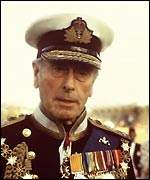
On this day in 1941, Captain Lord Louis Mountbatten, second cousin of King George VI of Britain and the only man other than the king to hold rank in all three military services simultaneously, is among those thrown into the Mediterranean Sea when his destroyer, the HMS Kelly, is sunk.
Mountbatten's ship was among several British cruisers, destroyers, and battleships sunk off Crete by German dive-bombers. The Kelly was attacked by 24 bombers alone; 130 crewmembers were killed. Mountbatten was still on the bridge of the ship when it finally flipped over; nevertheless, he managed to swim to shore and take control of the rescue operation. He would ultimately accept, as senior Allied officer present, the surrender of Japanese land forces within Southeast Asia by General Sieshiro Itagaki.
Side note: Just a day before the sinking of the Kelly, the battleship Valiant was damaged but not sunk during an equally vicious German air attack, also off Crete, which succeeded in sinking two cruisers and four destroyers. Among the crewmen of the Valiant was Lord Mountbatten's nephew, Prince Philip of Greece.
Mountbatten survived the terror of war against the Axis powers, only to be killed by an Irish Republic Army bomb, planted on his boat, on August 26, 1979. (History.com)
1944 World War II: FDR to Stalin:

I would appreciate receiving your views on my making a statement to be issued after 'D' day along the following lines in place of a tripartite statement to be issued by the Soviet, United States, and British Governments:
A suggestion has been made that the Allied Govenments issue a joint statements to the people of Germany and their sympathizers in which emphasis would be placed on the recent landings made on the European continent. I have not agreed with this as I might overemphasize the importance of these landings. What I desire to express to the German people and their sympathizers is that their defeat is inevitable. I also wish to emphasize to them that it is unintelligent on their part to continue in the war from now on. They must realize in their hearts that, with their present objectives and their present leaders, it is inevitable that they will be totally defeated. From now on, every German life lost is an unnecessary loss. It is true, from a cold-blooded point of view, that the Allies will also suffer losses. However, the Allies outnumber so greatly Germany in population and in resources that the Germans on a relative basis will be harder hit—down to the last family—than the Allies, and mere stubbornness will never help Germany in the long run.
It has been made abundantly clear by the Allies that they do not seek the total destruction of the People of Germany. What they seek is the total destruction of the philosophy of those Germans who have stated that they could subjugate the world. The Allies desire to attain the long-term goal of human freedom—greater real liberty—political, intellectual, and religious, and a greater justice, economic and social. We are being taught by our times that no group of men can ever be sufficiently strong to dominate the entire world. The United States Government and the people of the United States-—with almost twice the population of Germany—send word to the German people that this is the time for them to abandon the teachings of evil. By far the greater part of the population of the world of nearly two billion people feel the same way.
It is only Germany and Japan who stand out against all the rest of humanity. In his heart every German knows that this is true. Germany and Japan have made a disastrous and terrible mistake. Germany and Japan must atone reasonably for the wanton destruction of lives and property which they have committed. They must renounce the philosophy which has been imposed upon them—the falsity of this philosophy must be very clear to them now. The more quickly the fighting and the slaughter shall terminate, the more rapidly shall arrive a more decent civilization in the entire world. The attacks which the American, the British, and the Soviet Union and their associates are now making in the European theater will, we hope, continue with success. However, the people of Germany must realize that these attacks are only a part of many which will increase in volume and number until victory, which is inevitable, is attained.
Prime Minister Churchill has agreed to follow me with a message along the above lines.
1945 World War II: Various:
Flensburg:
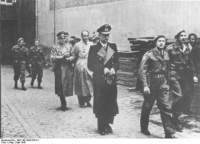
British tanks enter Flensburg, Germany. The British take several of the Nazis, who will be tried in the Major War Figures Trial, including Karl Doenitz, Alfred Jodl, Wilhelm Keitel, Alfred Rosenberg, and Albert Speer.
Led by Hitler's designated successor, Grand Admiral Karl Doenitz, the administration was referred to as the Flensburg government, as Flensburg, near the border with Denmark, was the headquarters of Doenitz by this time; and because the area the government controlled was limited to the vicinity of the town. [For further details, Click here.]
Death: Heinrich Himmler:
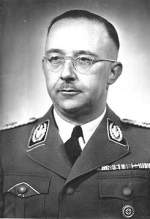
Heinrich Himmler, chief of the SS, assistant chief of the Gestapo, and architect of Hitler's program to exterminate European Jews, commits suicide one day after being arrested by the British.
As head of the Waffen-Schutzstaffel ("Armed Black Shirts"), the military arm of the Nazi Party, and assistant chief of the Gestapo (the secret police), Himmler was able over time to consolidate his control over all police forces of the Reich. The power he would ultimately wield would rival that of the German army; it would also prove highly effective in eliminating all opposition to Hitler and the party, as well as in carrying out the Fuhrer's Final Solution. It was Himmler who organized the creation of death camps throughout Eastern Europe and a pool of slave laborers.
Himmler's megalomania, which included a plan to surrender to the Western Allies late in the war in order to pursue the fight against Russia unimpeded, caused Hitler to strip him of all his offices and order his arrest. Himmler attempted to slip out of Germany disguised as a soldier, but was caught by the British. He swallowed a cyanide capsule a day later. (History.com)
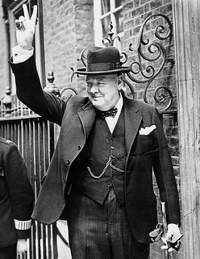
UK: Churchill forms a new caretaker government, to hold office until the elections in July.
1946 Various:
Nuremberg Tribunal: Hitler Youth leader Baldur von Schirach testifies on his own behalf:
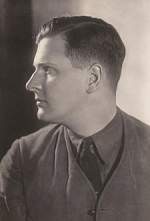
The name "Hitler" made its appearance in connection with the events of 9 November 1923. I was not able at the time to gain any exact information about him. This Trial has informed me and people of my generation for the first time what Hitler actually wanted.
At that time I was not a National Socialist. Together with some boys of my age I joined a youth organization which had the name "Knappenschaft." It was in some way connected with the people's movement, but it was not bound to any party. The principles of that organization were simply comradeship, patriotism, and self-control. There were about 100 boys from my city in it at the time who, in this youth organization, fought against the shallow tendencies of youth in the postwar period and against the dissipation indulged in by growing youngsters. In that circle, as a 16-year-old, I first came in contact with socialism, for here I found youths from every level, working boys, craftsmen, young office employees, sons of farmers. But there were some older ones among us too, who were already settled in life, and some also who had been in the World War. From discussions with these comrades I came to grasp for the first time the consequences of the Versailles Treaty in their full import.
The situation of the youth at the time was this: The schoolboy had the prospect of struggling through somehow or other as a working student, and then he would in all probability become a member of the academic proletariat for the possibility of an academic career practically did not exist for him at all. The young worker had no prospect of finding an apprenticeship. For him there was nothing other than the grim misery of unemployment. It was a generation nobody will help. [For Schirach's full testimony, Click here.]
From The Nuremberg Trial by Ann and John Tusa:
One newspaper described his testimony as "wearying the court." Lawrence (President of the Tribunal) intervened several times and threatened to stop the case unless Schirach stuck to the point, but he had difficulty finding a point to stick to . . . . When the judges withdrew at lunch time they held what Biddle called "a stormy discussion . . . I and the Russians think we ought to stop this hogwash." But other judges would not allow an intervention: "De Vabres thinks we must have 'psychological' background. Parker doesn't want the world to get the impression we are stopping freedom of speech." So that afternoon Schirach was left relatively undisturbed to try to persuade his listeners . . . .
Schirach gave testimony for a day and a half. He did not impress his audience. Many people, such as Ossian Goulding, were alienated by the tall, pallid man's "supercilious accents." Most people viewed him with a prejudice which, after the manner of the time, they hid in euphemism. Schirach might behave like the eternal scoutmaster, but he exuded the whiff of the kind of scoutmaster who ends up in the Sunday newspapers. But no one could bring themselves to use the word "homosexual." Instead an interrogator had written of his "rather unpleasant good looks," and the way his "tendency to puffiness seems to have been held in check." Someone else compared him to Ivor Novello, "anxious to keep up his youthful appearance."
Gilbert's report to Andrus was even more circumspect and talked of Schirach as "a curious aesthete with a narcissistic streak." Gilbert had gone on to say that Schirach's early rise to power had gone "to his romantic head" and that he was now "disillusioned at what he feels to be the betrayal of German youth by the elder leaders." Gilbert had actively nurtured this disillusionment in recent months; tried to wean Schirach from his hero worship of Goering; given encouragement to his flickering wish to condemn Hitler's abuse of German youth.
It is hard to believe that Gilbert was acting purely on his own initiative. Others beside must have seen an advantage in persuading the former leader of those young people to reject the training they had received and set them on a less dangerous path for the future. Should German youth come to share Schirach's disillusion, Germany would be easier to settle and incorporate into the European community. But there is no evidence to show that Gilbert discussed his strategy with others. Nor is there a hint anywhere that a bargain was considered. On the contrary, the prosecution records suggest that every effort was made to secure the maximum sentence. Gilberts diary shows Schirach struggling with his conscience, until deciding in early May that he had one last mission to the young people of Germany—to denounce Hitler before he died. He got his courage to the sticking point in the witness box around mid-morning on 24 May. He was noticeably ashen-faced.
American Action:A branch office is opened in Los Angeles with the announcement that American Action had been formed "to combat the inroads that have been made on the US government by alien-minded pressure groups." (THP)
1949 The German Federal Republic is established:
The Federal Republic of Germany (popularly known as West Germany) is formally established as a separate and independent nation. This action marked the effective end to any discussion of reuniting East and West Germany.
In the period after World War II, Germany was divided into four occupation zones, with the British, French, Americans, and Soviets each controlling one zone. The city of Berlin was also divided in a like fashion. This arrangement was supposed to be temporary, but as Cold War animosities began to harden, it became increasingly evident that the division between the communist and non-communist controlled sections of Germany and Berlin would become permanent. In May 1946, the United States halted reparation payments from West Germany to the Soviet Union. In December, the United States and Great Britain combined their occupation zones into what came to be known as Bizonia. France agreed to become part of this arrangement, and in May 1949, the three zones became one.
On May 23, the West German Parliamentary Council met and formally declared the establishment of the Federal Republic of Germany. Although Konrad Adenauer, the president of the council and future president of West Germany, proudly proclaimed, "Today a new Germany arises," the occasion was not a festive one. Many of the German representatives at the meeting were subdued, for they had harbored the faint hope that Germany might be reunified. Two communist members of the council refused to sign the proclamation establishing the new state.
The Soviets reacted quickly to the action in West Germany. In October 1949, the German Democratic Republic (East Germany) was officially announced. These actions in 1949 marked the end of any talk of a reunified Germany. For the next 41 years, East and West Germany served as symbols of the divided world, and of the Cold War animosities between the Soviet Union and the United States. In 1990, with Soviet strength ebbing and the Communist Party in East Germany steadily losing its grip on power, East and West Germany were finally reunited as one nation.
(History.com)1960 Adolf Eichmann captured:
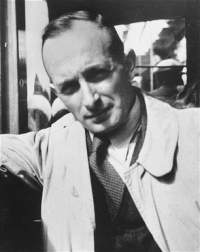
Israeli Prime Minister David Ben-Gurion announces to the world that Nazi war criminal Adolf Eichmann has been captured and will stand trial in Israel. Eichmann, the Nazi SS officer who organized Adolf Hitler's "final solution of the Jewish question," was seized by Israeli agents in Argentina on May 11 and smuggled to Israel nine days later.
Eichmann was born in Solingen, Germany, in 1906. In November 1932, he joined the Nazi's elite SS (Schutzstaffel) organization, whose members came to have broad responsibilities in Nazi Germany, including policing, intelligence, and the enforcement of Adolf Hitler's anti-Semitic policies. Eichmann steadily rose in the SS hierarchy, and with the German annexation of Austria in 1938, he was sent to Vienna with the mission of ridding the city of Jews. He set up an efficient Jewish deportment center and in 1939 was sent to Prague on a similar mission. That year, Eichmann was appointed to the Jewish section of the SS central security office in Berlin.
In January 1942, Eichmann met with top Nazi officials at the Wannsee Conference near Berlin for the purpose of planning a "final solution of the Jewish question," as Nazi leader Hermann Goring put it. The Nazis decided to exterminate Europe's Jewish population. Eichmann was appointed to coordinate the identification, assembly, and transportation of millions of Jews from occupied Europe to the Nazi death camps, where Jews were gassed or worked to death. He carried this duty out with horrifying efficiency, and between three to four million Jews perished in the extermination camps before the end of World War II. Close to 2 million were executed elsewhere.
Following the war, Eichmann was captured by U.S. troops, but he escaped the prison camp in 1946 before having to face the Nuremberg International War Crimes Tribunal. Eichmann traveled under an assumed identity between Europe and the Middle East and in 1950 arrived in Argentina, which maintained lax immigration policies and was a safe haven for many Nazi war criminals. In 1957, a German prosecutor secretly informed Israel that Eichmann was living in Argentina. Agents from Israel's intelligence service, the Mossad, were deployed to Argentina, and in early 1960 they finally located Eichmann. He was living in the San Fernando section of Buenos Aires, under the name Ricardo Klement.
In May 1960, Argentina was celebrating the 150th anniversary of its revolution against Spain, and many tourists were traveling to Argentina from abroad to attend the festivities. The Mossad used the opportunity to smuggle more agents into the country. Israel, knowing that Argentina might never extradite Eichmann for trial, had decided to abduct him and take him to Israel illegally. On May 11, Mossad operatives descended on Garibaldi Street in San Fernando and snatched Eichmann away as he was walking from the bus to his home. His family called local hospitals but not the police, and Argentina knew nothing of the operation. On May 20, a drugged Eichmann was flown out of Argentina disguised as an Israeli airline worker who had suffered head trauma in an accident. Three days later, Prime Minister Ben-Gurion announced that Eichmann was in Israeli custody.
Argentina demanded Eichmann's return, but Israel argued that his status as an international war criminal gave it the right to proceed with a trial. On April 11, 1961, Eichmann's trial began in Jerusalem. It was the first trial to be televised in history. Eichmann faced 15 charges, including crimes against humanity, crimes against the Jewish people, and war crimes. He claimed he was just following orders, but the judges disagreed, finding him guilty on all counts on December 15 and sentencing him to die. On May 31, 1962, he was hanged near Tel Aviv. His body was subsequently cremated and his ashes thrown into the sea.
Edited by Levi Bookin (Copy editor)
levi.bookin@gmail.com



Click to join 3rdReichStudies


Disclaimer: This site includes diverse and controversial materials—such as excerpts from the writings of racists and anti-Semites—so that its readers can learn the nature and extent of hate and anti-Semitic discourse. It is our sincere belief that only the informed citizen can prevail over the ignorance of Racialist "thought." Far from approving these writings, this site condemns racism in all of its forms and manifestations.
Fair Use Notice: This site may contain copyrighted material the use of which has not always been specifically authorized by the copyright owner. We are making such material available in our efforts to advance understanding of historical, political, human rights, economic, democracy, scientific, environmental, and social justice issues, etc. We believe this constitutes a "fair use" of any such copyrighted material as provided for in section 107 of the US Copyright Law. In accordance with Title 17 U.S.C. Section 107, the material on this site is distributed without profit to those who have expressed a prior interest in receiving the included information for research and educational purposes. If you wish to use copyrighted material from this site for purposes of your own that go beyond 'fair use', you must obtain permission from the copyright owner.
Please Note: The list-owner and moderators of 3rdReichStudies are not responsible for, and do not necessarily approve of, the random ads placed on our pages by our web server. They are unfortunately, the price one pays for a 'free' website.